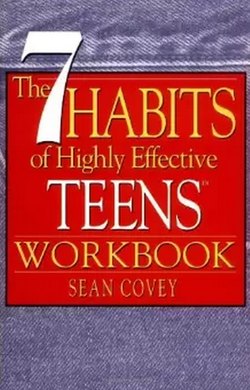Читать книгу The 7 Habits of Highly Effective Teens - Sean Covey - Страница 3
На сайте Литреса книга снята с продажи.
ОглавлениеPart I: The Setup
TAKE THE PLUNGE
Learn the 7 Habits
• Use the highlight feature to mark parts you want to remember.
• Memorize quotes.
• Study the eWorkbook and think throughout the questions and concepts.
• Make the learning fun.
Live the 7 Habits
• Personalize and apply each habit to your life.
• Challenge yourself to move out of your comfort zone.
• Commit to do the baby steps at the end of each chapter in the book.
Share the 7 Habits
• Discuss with a friend, parent, guardian, or teacher ideas that are important to you.
• Share with someone you feel close to the commitments or ways you want to change.
To get the most from The 7 Habits of Highly Effective Teens, you have to make an investment. It will require time and commitment. Take a few minutes and glance through the book and this eWorkbook. Look at the pictures and read the headlines and quotes that interest you. Begin to understand an idea of what this book is all about and what you might “get” from reading it.
Once you’ve glanced through the pages of the book and eWorkbook, keep track of your personal experiences using the notes feature on your device or a separate sheet of paper.
Personal Expectations:
From reading The 7 Habits of Highly Effective Teens, I hope to be able to:
| Achieve Greatness | MyNotes |
| Improve Myself | MyNotes |
| Face Issues I’ve Struggles With | MyNotes |
| All of the Above | MyNotes |
Something to think about:
Did you check All of the Above? If you did, great job! That is the sort of positive thinking that leads to success. However, if you were hesitant, it is okay. But now think of what caused your hesitation.
GET IN THE HABIT
Now think the opposite way:
What is the opposite of responsibility? Without responsibility is it possible to define your goal in life? Do you think it is beneficial to do the most important things first? Or is it a waste of time? How would life be if you lived it with an everyone-should-lose attitude? Rather than listening to people and their views, you simply ignore them. Instead of working together, you hinder yourself by limiting your success. Does any of this make sense? After living a day with this mentality would you want to renew yourself?
The opposite way of thinking is always worth considering, but at the end of the day, living with an opposite mindset of the 7 Habits does not make you, it breaks you.
PARADIGMS AND PRINCIPLES
What You See is What You Get
Paradigm (n): The way you think about and see things.
With this definition in mind, let’s play a game.
Close your eyes and think of your favorite genre of music.
Try to listen to it in your head.
Using the notes feature on your device or your scratch paper, mark down what is it about this type of music that speaks to you?
Once you’ve come to terms with why you are drawn to this sound, put this book down and go speak with your parents, siblings and friends. Find out their opinions on music.
Did your paradigm change after listening to the paradigms of others?
“Paradigms are like glasses. When you have incomplete paradigms about yourself or life in general, it’s like wearing glasses with the wrong prescription.”
- Sean Covey
Take a hard look at this picture.
What do you see? And more importantly, what helped you reach this conclusion?
Now look at this more complete version of the image from the previous page:
Is the picture what you thought it was? If not, you just experienced a paradigm shift – the way you saw something, your point of view, changed.
Some of our paradigms are about life in general. You can usually tell what your paradigms are by asking yourself “What is my life centered on?”
Before we move on, use this circle:
Look at the border. This border will serve as a divider. Outside of the circle place all the things you spend your time on: friends, school, music, movies, sports…
Use the notes feature or your pad to write these things down. We’ll come back to them shortly.
MyNotes
Principle (n): A natural law or basic truth (i.e., honesty, service, love).
Mental Quiz
Let’s play a game. This quiz will not only help you with understanding principles, but it will also exercise your mind.
Can you think of other important principles? Think of them and carry them in your mind. Consider what makes them important to you.
Now that you have this list and you’ve examined it, how do you learn from it? The first place is to understand that principles are difficult to abide by. Which one is the most difficult for you?
Is your mind feeling stronger as it tries to juggle all these different variables? Good!
Now, remember the circle from earlier? The one with the divider. What was it separating? Inside the center of the circle, let’s insert the word “principle.” Now going back to the notes feature or your notepad, write down a few principles that you find most difficult to live.
